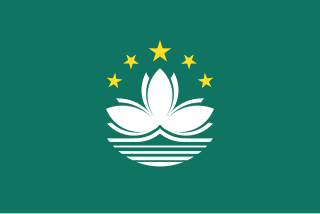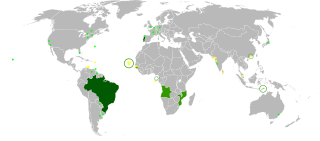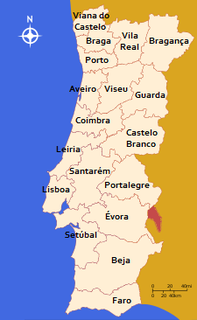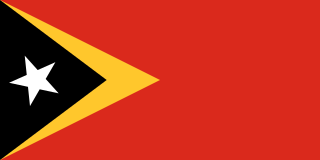
The Azores, officially the Autonomous Region of the Azores, is one of the two autonomous regions of Portugal. It is an archipelago composed of nine volcanic islands in the North Atlantic Ocean about 1,360 km (850 mi) west of continental Portugal, about 1,643 km (1,021 mi) west of Lisbon, in continental Portugal, about 1,507 km (936 mi) northwest of Morocco, and about 1,925 km (1,196 mi) southeast of Newfoundland, Canada.

Lisbon is the capital and the largest city of Portugal, with an estimated population of 505,526 within its administrative limits in an area of 100.05 km2. Its urban area extends beyond the city's administrative limits with a population of around 2.8 million people, being the 11th-most populous urban area in the European Union. About 3 million people live in the Lisbon Metropolitan Area, including the Portuguese Riviera,. It is mainland Europe's westernmost capital city and the only one along the Atlantic coast. Lisbon lies in the western Iberian Peninsula on the Atlantic Ocean and the River Tagus. The westernmost areas of its metro area form the westernmost point of Continental Europe, which is known as Cabo da Roca, located in the Sintra Mountains.

Macau or Macao, officially the Macao Special Administrative Region of the People's Republic of China, is a special administrative region on the western side of the Pearl River estuary in southern China. With a population of 653,100 and an area of 32.9 km2 (12.7 sq mi), it is the most densely populated region in the world.

Mozambique, officially the Republic of Mozambique, is a country located in Southeast Africa bordered by the Indian Ocean to the east, Tanzania to the north, Malawi and Zambia to the northwest, Zimbabwe to the west, and Eswatini (Swaziland) and South Africa to the southwest. The sovereign state is separated from the Comoros, Mayotte and Madagascar by the Mozambique Channel to the east. The capital of Mozambique is Maputo while Matola is the largest city, being a suburb of Maputo.

Portuguese is a Western Romance language originating in the Iberian Peninsula. It is the sole official language of Portugal, Brazil, Cape Verde, Guinea-Bissau, Mozambique, Angola, and São Tomé and Príncipe. It also has co-official language status in East Timor, Equatorial Guinea and Macau in China. As the result of expansion during colonial times, a cultural presence of Portuguese and Portuguese creole speakers are also found in Goa, Daman and Diu in India; in Batticaloa on the east coast of Sri Lanka; in the Indonesian island of Flores; in the Malacca state of Malaysia; and the ABC islands in the Caribbean where Papiamento is spoken, while Cape Verdean Creole is the most widely spoken Portuguese-based Creole. Reintegrationists maintain that Galician is not a separate language, but a dialect of Portuguese. A Portuguese-speaking person or nation is referred to as "Lusophone" (Lusófono).

Portuguese Mozambique or Portuguese East Africa are the common terms by which Mozambique is designated when referring to the historic period when it was a Portuguese overseas territory. Portuguese Mozambique constituted a string of Portuguese colonies and later a single Portuguese overseas province along the south-east African coast, which now forms the Republic of Mozambique.

Porto is the second-largest city in Portugal after Lisbon and one of the major urban areas of the Iberian Peninsula. The city proper has a population of 287,591 and the metropolitan area of Porto, which extends beyond the administrative limits of the city, has a population of 2.3 million (2011) in an area of 2,395 km2 (925 sq mi), making it the second-largest urban area in Portugal. It is recognized as a gamma-level global city by the Globalization and World Cities (GaWC) Study Group, the only Portuguese city besides Lisbon to be recognised as a global city.

The Districts of Portugal, are the most important first-level administrative subdivisions of mainland Portugal. Currently, mainland Portugal is divided into 18 districts. The Portuguese autonomous regions of Açores and Madeira are no longer divided into districts.

The Algarve is the southernmost region of continental Portugal. It has an area of 4,997 km2 (1,929 sq mi) with 451,006 permanent inhabitants, and incorporates 16 municipalities. The region has as its administrative centre in the city of Faro, where both the region's international airport (FAO) and public university, the University of Algarve, are located. Tourism and related activities are extensive and make up the bulk of the Algarve's summer economy. Production of food, which includes fish and other seafood, different types of fruit such as oranges, figs, plums, carob beans, and almonds, is also economically important in the region. Although Lisbon surpasses the Algarve in terms of tourism revenue, the Algarve is still, overall, considered to be the biggest and most important Portuguese tourist region, having received an estimated total of 7.1 million tourists in 2017. Its population triples in the peak holiday season due to seasonal residents. The Algarve is also increasingly sought after, mostly by central and northern Europeans, as a permanent place to settle. A 2016 American-based study concluded that the Algarve was the world's best place to retire.

East Africa or Eastern Africa is the eastern region of the African continent, variably defined by geography. In the United Nations Statistics Division scheme of geographic regions, 20 territories make up Eastern Africa:

Administratively, Portugal is de jure unitary and decentralized state. Nonetheless, operationally, it is highly centralized system with administrative divisions organized into three tiers. The State is organized under the principles of subsidiarity, local government autonomy, and democratic decentralization of the public service.

Portuguese people are a Romance ethnic group indigenous to Portugal that share a common Portuguese culture and speak Portuguese. Their predominant religion is Christianity, mainly Roman Catholicism, though vast segments of the population, especially the younger generations, have no religious affiliation. Historically, the Portuguese people's heritage largely includes the pre-Celts and Celts, who became culturally Romanized during the conquest of the region by the ancient Romans. A number of Portuguese also can trace limited descent from Germanic tribes who arrived after the Roman period as ruling elites, including the Suebi and Visigoths in northern Portugal, as well as converted Jewish and North Africans as a result of the Moorish occupation of the Iberian Peninsula, especially in the Algarve region of southern Portugal.

Norte or Northern Portugal is the most populous region in Portugal, ahead of Lisboa, and the third most extensive by area. The region has 3,689,173 inhabitants according to the 2011 census, and its area is 21,278 km². It is one of five regions of Mainland Portugal. Its main population center is the urban area of Porto, with about one million inhabitants; it includes a larger political metropolitan region with 1.8 million, and an urban-metropolitan agglomeration with 2.99 million inhabitants, including Porto and a number of urban areas in Northwestern Portugal, ranging from Braga to Aveiro. The Commission of Regional Coordination of the North (CCDR-N) is the agency that coordinates environmental policies, land-use planning, cities and the overall development of this region, supporting local governments and associations.

Protected areas of Brazil included various classes of area according to the National System of Conservation Units (SNUC), a formal, unified system for federal, state and municipal parks created in 2000.

UTC±00:00 is the following time:

East Timor or Timor-Leste, officially the Democratic Republic of Timor-Leste, is a country in Maritime Southeast Asia. It comprises the eastern half of the island of Timor, the nearby islands of Atauro and Jaco, and Oecusse, an exclave on the northwestern side of the island surrounded by Indonesian West Timor. Australia is the country's southern neighbour, separated by the Timor Sea. The country's size is about 15,410 km2.

Galician is an Indo-European language of the Western Ibero-Romance branch. It is spoken by some 2.4 million people, mainly in Galicia, an autonomous community located in northwestern Spain, where it is official along with Spanish. The language is also spoken in some border zones of the neighbouring Spanish regions of Asturias and Castile and León, as well as by Galician migrant communities in the rest of Spain, in Latin America, the United States, Switzerland and elsewhere in Europe.



















